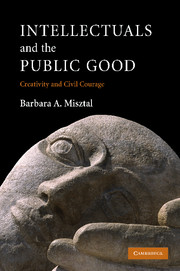Book contents
- Frontmatter
- Contents
- List of tables
- Acknowledgements
- Introduction
- Part I Theoretical framework
- Part II Public intellectuals: the case of the Nobel Peace Prize laureates
- 5 Intellectuals for peace
- 6 Heroes: legends in their own time
- 7 Dissidents: peaceful rebels
- 8 Champions: promoting the cause
- 9 Pioneers: bringing science to politics
- Conclusion
- References
- Index
8 - Champions: promoting the cause
Published online by Cambridge University Press: 22 September 2009
- Frontmatter
- Contents
- List of tables
- Acknowledgements
- Introduction
- Part I Theoretical framework
- Part II Public intellectuals: the case of the Nobel Peace Prize laureates
- 5 Intellectuals for peace
- 6 Heroes: legends in their own time
- 7 Dissidents: peaceful rebels
- 8 Champions: promoting the cause
- 9 Pioneers: bringing science to politics
- Conclusion
- References
- Index
Summary
Influencing public opinion and campaigning for reforms
A ‘champion’, in the most common understanding of the term, is either someone who has won first place in a competition or someone who fights for a cause. While the former stresses engagement in a contest and being a winner in competition, the latter puts the emphasis on engagement in acting or speaking on behalf of a specific reason or interest; on being a defender or a promoter of an idea, project or purpose. What these two definitions have in common is their indirect assumption that champions deserve our admiration as winners in challenging competitions or as achievers of noble goals.
Here, we employ the label ‘champion’ to describe a type of public intellectual who meets our criteria for inclusion in this category, as discussed in chapter 4. The category of champions, located in the informalised and low-risk sector, depicts public intellectuals who reach beyond their informal networks to advance a particular group interest or to support a specific cause. Champions are scholars, writers and journalists who, because of their devotion to a particular purpose, could be at odds with the official creed of their country, yet generally their relationships with the authorities, in contrast to dissidents, are not characterised by total hostility. Not only do champions benefit from a higher degree of social integration but, occasionally, they also have access to the wielders of power, and sometimes they even move in the circles of power themselves.
- Type
- Chapter
- Information
- Intellectuals and the Public GoodCreativity and Civil Courage, pp. 181 - 209Publisher: Cambridge University PressPrint publication year: 2007



